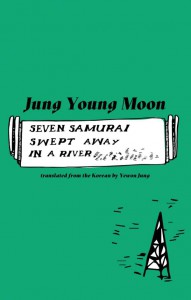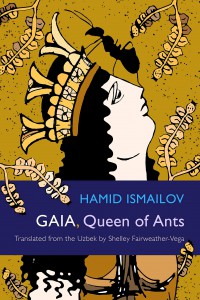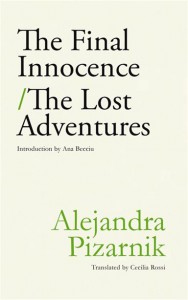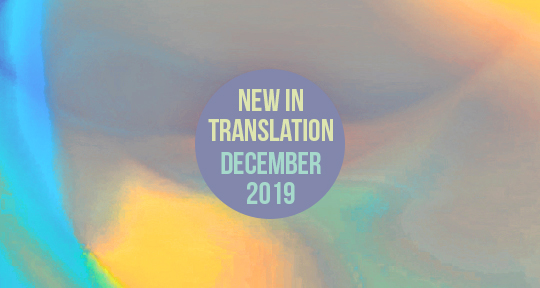It has been a wonderful year of covering, dear reader, the most fascinating translated works of world literature. Today, we are back with three more varied and exceptional books. Below, find reviews of a discursive and genre-bending Korean work, a powerful Uzbek novel that traverses existential questions of migration and hybridity, and the intimately potent lines of a young Argentine poetess.

Seven Samurai Swept Away in a River by Jung Young Moon, translated from the Korean by Yewon Jung, Deep Vellum Publishing, 2019
Review by Jacqueline Leung, Editor-at-Large for Hong Kong
To Jung Young Moon, the author of Seven Samurai Swept Away in a River, meaninglessness is a more accurate portrayal of reality than contrived narratives. Continuing the fascination of Vaseline Buddha, one of his earlier novels which delves into the mind of an insomniac writer, Moon experiments with how the novel as a genre may go beyond the typical constituents of character, plot, and structure, and whether or not readers are able to find enjoyment in navigating largely banal thoughts and experiences.
Set in Texas, where Moon did a residency in 2017 (specifically, in Corsicana, which he refers to as “C, a small town near Dallas”), Seven Samurai culminated from his desire to write about the state. But Moon does not know much about Texas, nor does he pretend to do so. Meandering through a list of stereotypes, from the assassination of President John F. Kennedy to cowboys to the disdain for adding beans to chilli, Moon does not so much feature Texas as a place of interest, but rather as a springboard for his endless ruminations that find beginnings in almost anything, but that ultimately lead nowhere.
Swinging from one topic to another, depending on what crosses his mind, Moon relays conversations and everyday experience in Texas and wanders by stream of consciousness. Denoting this method as “the paralysis of consciousness” or even “the derangement of consciousness,” Moon delves into metafictive inconsequentiality. There is little separation, if any, between the narrator and Moon himself, nor is there any tension that typically drives and connects the episodes in fiction. Instead, the trajectory of his thoughts evolves largely by association, almost like a game of word chain: thinking about Jack Ruby (the killer of Lee Harvey Oswald) and his dogs, Moon writes about his peers who adopted dogs and cats, which causes him to expound on the story of the first cat to visit space; once he has exhausted the tale, Moon moves on to describe a time when he visited a farm with a (supposed) part from a spaceship and a bovine with large horns. A sentence would begin to assert something, then double back on itself or go down several paths of possibility, and it is with great credit to the translator Yewon Jung that we see an adroit portrayal of the text’s convolution. At times, there are more lucid moments when Moon reiterates the purpose of his endeavor:
The seven samurai seemed to be telling me to write something akin to them fighting one another for no reason or motive, or like them getting swept away in a river, something that was almost nothing about something that was almost nothing.
The seven samurai hail from Akira Kurosawa’s eponymous 1954 film. While the samurai recur throughout the text, Moon admits to knowing little about them, having only watched the film once and not remembering any of its plot, thereby removing any significance the motif might carry or point of entry for intertextual analysis—even though the film also raises questions about strife and success. (In the film, seven samurai are hired by farmers to fight off bandits invading the village. The samurai emerge victorious, but their triumph is rendered moot with the severe casualties and deaths they suffer.)
However, to the extent that meaninglessness is the de facto state of existence and narrative, Moon assigns meaning to the process of its discovery, of being aware and skeptical, and there is a certain joy to be felt in the search for experimental ways of representation. He mentions at several points that Seven Samurai is a novel that could face potential mockery, something “even a passing dog would laugh at,” but still declares its worth against conventional fiction which wrongly represents life as being rife with plot, and states that a reconsideration of the novel form may lead to a freer kind of writing, befitting our times. Understanding that, by nature, language cannot depict emptiness or meaninglessness in absolute faith, Moon delights in vagueness and playful provocation, exuding apathy but also wondering if readers are willing to come along for the ride—if they will be baffled and find the text utter nonsense, or instead, interested to entertain a novel about nothing much in particular.

Gaia, Queen of Ants by Hamid Ismailov, translated from the Uzbek by Shelley Fairweather-Vega, Syracuse University Press, 2019
Review by Filip Noubel, Editor-at-Large for Uzbekistan
Having known Hamit Ismailov for years and having interviewed him several times, in addition to having had the privilege of translating his texts into French, I knew I was in for a treat when I started reading Gaia, Queen of the Ants. What I didn’t expect, however, was how Ismailov’s prose would echo my most recent existential questions: the myth of fixed identities and the shamanistic power of language.
The novel revolves around four main characters whose connections will eventually turn out to be much deeper than their appearances. The leading figure, who gives her name to the book, is Gaia Mangitkhanova, a retired woman of Uzbek origins. Even though she is in her late-seventies and lives under the rainy British sky, she has maintained a solid, if not insatiable, appetite for men and stories. It is hard to love her, but it is even harder to ignore her, as other characters and the reader rapidly find out. She is a central figure who, not unlike her namesake Gaia of ancient Greece, is a metaphorical Mother Earth who gives birth to all beings.
Then there is Domrul, a young social carer, who—like Gaia—comes from Uzbekistan. As a child, he witnessed the horrendous 1989 massacre of his community—the Meskhetian Turks, who had come from Georgia to Soviet Central Asia—but eventually managed to land on British soil. As chance would have it, he is assigned as caregiver to Gaia who, in no time, manages to trap him in a cunning plot that will not end well for any of them.
Domrul also has a girlfriend who goes by the name of Emer, a seemingly carefree Irish girl who represses a traumatic childhood (which will lead her to more painful experiences as the plot takes her to Uzbekistan). The fourth main character is Kuyuk Baxshi, an older bard and musician who lives in Tashkent, the capital of Uzbekistan, and whose impromptu verses are spilled across the book as he shares his Sufi wisdom and humor in every mournful or joyful situation he encounters.
In fact, this simple if not simplistic description of the book’s heroines and heroes is false, because in Ismailov’s world, names and identities, origins and faiths, loyalties and alliances are all built on shaky and rapidly changing grounds. Is it Gaia or Goia? Emer or Aivar? And is she Catholic or Evangelical Christian? What about Kuyuk Baxshi, is he Karakalpak or Turkmen? Is Domrul Meskhetian Turk, Uzbek, or British, as he is asked at an airport crossing? What is to be made of this hybridity? Emer’s mother seems to have a negative view of this unsettling fluidity as she reflects on her daughter, whom she took to grow up in Sarajevo when she was still a small child: “It was like transplanting a sapling from the garden to the stones of the mountain. It would have neither the beauty of a garden-grown plant nor the hardiness of a plant grown on the mountain slopes. Just confusion.” But we are told in the following sentence that: “If you were to ask Domrul, he would paint a completely different picture.”
I asked Hamit about his views on hybridity in the context of this novel, and he told me this: “I tend to agree with Emer’s mum, that the ‘tectonic changes’ or traumas lived through during puberty or a transformative age must be the deepest ones. I lost my mother when I was twelve, and it took me years and years to understand what kind of void and emptiness that tragedy had created inside of me. Maybe that explains the fact that in a number of my novels, I was deeply interested in and dealing with this particular age (The Railway, The Underground, The Dead Lake). There should be psychological studies to research these kind of issues, but witnessing Emer’s life, my guess is that her mum was mostly right.”
And here I could not help thinking of a quote from Salman Rushdie’s most recent novel Quichotte, in which the main character explains how he defines himself: “This is what he said when he was questioned: that he was not rootless, not uprooted but transplanted.” Central Asia is that place of constant transplantation—a region where shifting empires, Tsarist colonialism, and Soviet deportations have brought together Turkic and Persian cultures, Russian speakers and deported Germans, Tatars, Chechens, and Koreans, and where political oppression and economic stagnation have put millions on the roads to Turkey or Europe: where being a chameleon can save your life, and ultimately becomes the only possible identity.
Ismailov’s second tour de force in this novel is the way he turns language itself into the true main character, a powerful shaman who can cast spells, dance, whirl, and punch the reader with sentences such as: “She would slap your head with a hand so firm the soup would start boiling in your ears.” More often than not, characters get lost in translation, or become the butt of jokes spoken in a language they don’t know. Sometimes, language unravels a story in the story, wraps itself into mythical narratives, and turns characters into mirrors of each other: isn’t Gaia a mermaid just like Emer is? Language invites the voice of the narrator to address directly the reader; it suddenly contracts into verses, reminding the reader that this story is a shamanistic tale as each main part of the book is given the name of elements: earth, fire, air, and water that eventually all meet and unleash dramatic conflicts.
Here a special mention should be made of the translator Shelley Fairweather-Vega, who explains in the introduction and in an interview (which I recently conducted) the many challenges of translation from Uzbek, a language that changed its alphabet from Arabic to Latin to Cyricllic and back to two versions of Latin in less than a hundred years. What spelling should be used to render those words in English? Another challenge is that many characters speak languages as non-native speakers, and some of their errors need to be maintained in English and recognized as such. Regardless of those difficulties and sometimes impossible choices, she has managed to produce a translation that retains all the irony, bitter humor, nostalgia, and vigor of the original. As she told me: “Gaia is a novel that demands the retention of a good deal of “foreignness” in the translation; all the main characters are displaced, torn against their will out of their native cultural context and homes and languages. They feel at home nowhere. The language in the book, I thought, should reflect that feeling, and make readers feel similarly uncomfortable, at least sometimes.” A great translator’s feast to honour indeed.
There is one more gift Ismailov offers the reader: a very thin layer of Proustian nostalgia, which is exactly why I read and savour every novel Ismailov has written, finding traces of my Tashkent childhood in them. In this part, the Proustian madeleine gets a Soviet remake: ”He told the begum about his childhood. They drank some more, the begum brought out some Russian caramels, and another teacup later, she served up more Russian treats: gingerbread and wafer cookies. That did it for Domrul. He was recalling how, on his first day of first grade, his mother had given him a Rot-Front chocolate.” Ismailov is, in fact, an exile who to this day is not allowed to return to his home country, but his longing for the place is ever present in details that convert his books into real emotional landscapes.
This is perhaps best rendered in one of my favorite parts of his book: “As anyone who has gone through tragedies. . . a child goes through life like a traveler pressed up against the back window of a tram car. His lifelong gaze is focused on the past—not on the tragedy, but on the peace and quiet that preceded the tragedy, the paradise that was lost. But your gaze is not forward-looking, but rather on the passing, vanishing tracks. So therefore the future always seems to be stabbing you in the back like a bloodthirsty traitor.”
If there is one reason why you, reader, should not hesitate to pick up this book, this is why: on one of the very first times Emer and Domrul go out together, she tells him this: “If I ever become a mother, I’ll raise my children to be great and glorious as a chestnut tree, driven and determined, polemical and poetical.” I can think of no better way to describe Ismailov’s novel.

The Last Innocence / The Lost Adventures by Alejandra Pizarnik, translated from the Spanish by Cecilia Rossi, Ugly Duckling Presse, 2019
Review by Georgina Fooks, Communications Manager
Alejandra Pizarnik was just twenty when she published the first of these two collections, The Last Innocence, which was followed by The Lost Adventures two years later. Yet despite her young age, what strikes a first-time reader of Pizarnik’s poetry is the strength of her voice. The themes of childhood, fear, suffering, the night, life, and death are explored extensively in these early collections that mark the true beginning of her poetic career. Pizarnik’s prodigious talent forms part of her mythologisation in the canon of Argentine poetry: her life story evokes that of a tormented but talented young poet, who died at the age of thirty-six after an overdose of Seconal.
It’s hard, once you know this context, to read her work without it influencing your perception. Pizarnik’s poetry is emotional, violent, and intimate—indeed, a great deal of her poetic work was first included in her personal journals, and the references to herself and her biography make it hard to separate the poet from her poetic voice. In “Woman in Love” from The Last Innocence, she addresses herself in the second person:
this dismal obsession with living
this distant madness of living
it’s dragging you down alejandra don’t deny it.
Her voice is direct, personal, almost conversational—but the stakes here are high. The questions of living and existence recur throughout her work, reflecting that “obsession” she speaks of: but this madness of living is more than a personal concern, it is a poetic one.
“The Awakening”, taken from The Lost Adventures, references the title of the first collection contained in this book, and gives the “last innocence” a personal and poetic meaning. The poem reads like a litany; “Lord” is a refrain that propels the poem and gives rhythm to the torment being explored. Fear is a recurring theme throughout both collections, and it’s present here:
What shall I do with my fear
What shall I do with my fear
The repeated phrases here are reminiscent of the way fear can send you spiralling, lost in uncertainty: but the poem is called “The Awakening”, suggesting a kind of divine revelation at play. It’s a moment of epiphany, a sense of mourning for childhood, and a moment of self-discovery, even if it is a terrifying one. The “last innocence has burst”, she writes, suggesting an explosive destruction—“I have consumed my life in one instant”—of a candle that burned too bright and too fast. Time and memory are inherently unstable:
When I was a girl
I mean yesterday
I mean centuries ago
Throughout these two collections, Pizarnik plays with our knowledge of her—as a young woman, barely twenty—but explores greater questions of existence, which are incomprehensible and elusive, but something that the poet is constantly trying to understand.
Pizarnik’s poetry is deeply personal and incredibly intimate, but also so much more. It is far from sentimental but something made, something crafted. Given that the style of these two collections is markedly different to her first, and published under a different name—Alejandra Pizarnik, as opposed to her full name, Flora Alejandra Pizarnik—it is clear that what we see here is the forging of a unique poetic voice and style. The violence of emotion felt in these poems does not necessarily signify an emotional spontaneity in her work—Pizarnik often rewrote and corrected her own writings, as evidenced in her own diaries.
Her short poems have a visual grace to them: Pizarnik was not only a poet but a painter as well, and she exploits the freeform of her verse to enhance its linguistic effects. In “Just a name”, she layers her name so that we dig down through the lines to reach the poetic voice’s essence:
alejandra alejandra
beneath I am me
alejandra
While “alejandra” is only a name, it’s the best linguistic tool she has to represent her being—it’s just a word, but it’s the only word she has to describe herself in her totality.
Reading the collection, you get a sense of the poet not simply finding her voice, but forging it. In the poem “Salvation”, she writes: “the young woman finds the mask of infinity / and cracks the wall of poetry”. Poetry in Pizarnik’s work is effort and labour, but it’s infinitely worth pursuing for the sake of finding her truest form of expression. In a diary entry from May 6, 1962, she writes: “my words shall be like clocks or scientific instruments of high fidelity”.
This is why, despite the fear and suffering that runs through her work, the reader receives a sense of resilience. This is a poet who is seeking a true voice, one that can be faithful to the nature of experience; as she wrote in her letters to Clara Silva, she has an “aspiration toward a luminous poetry, not a rhetorical or intellectual, or conceptual poetry”. She speaks of her intuition that allows her to approach the “making of true poetry”—where true poetry for her means “essential, necessary, original”. There’s hope, aspiration, and struggle among the suffering, and a sense of conviction when she writes:
still I want to know myself alive
still I do not wish to speak
of death
or its strange hands.
*****
Read more on the Asymptote blog:

